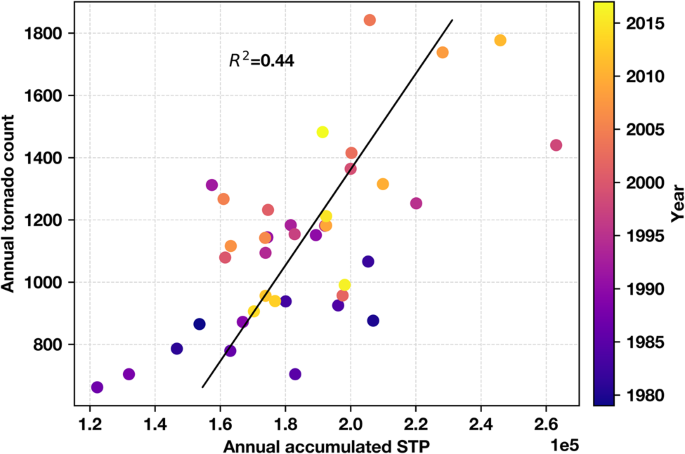Casuarina Head
Member
Severe Tornado Outbreaks
defined as outbreaks with:
≥ 2 long-tracking tornado families
each family w/ ≥ 2 (E)F3+ tornadoes
each of these w/ path lengths ≥ 25 mi
these families over wide geographic area
Examples:
19–20 February 1884
28 March 1890
29–30 April 1909
28 March 1920
9 May 1927
21–22 March 1932
16 March 1942
21–22 March 1952
2–3 April 1956
11–12 April 1965
3–4 April 1974
5–6 February 2008
27 April 2011
defined as outbreaks with:
≥ 2 long-tracking tornado families
each family w/ ≥ 2 (E)F3+ tornadoes
each of these w/ path lengths ≥ 25 mi
these families over wide geographic area
Examples:
19–20 February 1884
28 March 1890
29–30 April 1909
28 March 1920
9 May 1927
21–22 March 1932
16 March 1942
21–22 March 1952
2–3 April 1956
11–12 April 1965
3–4 April 1974
5–6 February 2008
27 April 2011
SourceI think that the overall warming of the Pacific basin over the past decade, coupled with recent -AMO trends (weakening AMOC) in the North Atlantic, has made low-amplitude, progressive patterns less likely, even during -ENSO/-PDO setups, hence the dearth of major, widespread tornado outbreaks, for the most part, since 2011–12, especially over the Plains. So events like Palm Sunday 1920/‘65, Super Outbreaks ‘74/‘11, Super Tuesday ‘08, et al. will be harder to come by for the most part, due to AGW being reflected in the absorption of heat and fresh water by the major ocean basins, especially the Pacific and the North Atlantic.
SourceClimate change is leading to forces that make widespread, violent tornado activity—that is, outbreaks with multiple long-tracking supercell tornado families over a wide geographic area—less likely than it was prior to 1965 and especially prior to 2013. Certain models, including mesoscale such as the NAM/HRRR, still struggle to account for climate change’s impact on wavelengths vis-à-vis the warmer Pacific and the weaker AMOC signal in the Atlantic. Significant tornado outbreaks can still occur, but they are becoming less frequent, more limited in aerial coverage, and more confined to one (or two) big supercell that thrives more due to mesoscale quirks than large-scale synoptic factors vs. the past.
Last edited:





